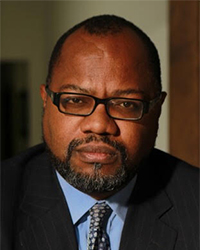The Honorable Richard F. Boulware II

How does your “day job” affect your teaching?
In my teaching of trial practice, I often impart to students my experience presiding over trials as it relates to the best and worst practices of attorneys who try cases in front of me. I also share with them what I have gleaned regarding trial practice from my many conversations with jurors after trials have been completed.
How do you see the legal profession evolving in the next ten years or so?
I see an expanding need for new lawyers to pursue public interest law. Given the escalating costs of litigation and the fact that courts are one of the main social mechanisms for enforcing civil, employment and environmental rights, access to justice and to the court system becomes increasingly important, especially for individuals or community interests with fewer resources. The entire legal profession must work collectively to ensure that our state and federal court systems provide equal access and, significantly, equal priority to legal claims for all litigants and not just those with substantial financial resources. I see this as the greatest challenge facing our profession in the next ten to twenty years.
What have you read or observed this year that made a real difference to you?
I recently re-viewed the Eyes on the Prize documentary, read Devil in the Grove by Gilbert King and visited the African-American History Museum in Washington, D.C., and these experiences and this book reminded me of the courage of civil rights attorneys and of citizens of all backgrounds who risked their physical safety and community standing to oppose racial intolerance and discrimination. While our nation has progressed remarkably in a short period of time, we must remain, as a community and a nation, ever vigilant against rising currents of intolerance and bigotry.
What is the important advice for new law graduates?
I encourage new law graduates to clerk if they have the opportunity. Public interest lawyers especially need to understand what the opportunities and limits of the system are, in terms of monetary and injunctive remedies. I advise law students that they should familiarize themselves with public interest organizations and their requirements while they are in law school. Openings for public interest attorneys are not as well advertised as those in the private sector but they are extremely competitive. Finally, I encourage new law graduates to take professional risks in the early part of their career. I tell new law graduates remember why you went to law school and pursue your dream job. They should consider jobs in other locations and in unique areas of the law. As one gets older professionally, it can be more difficult to pursue the variety of legal opportunities that are available early in your career. The legal profession offers many fulfilling and compelling options and young lawyers, and even us “old” lawyers, should pursue as many as we can.